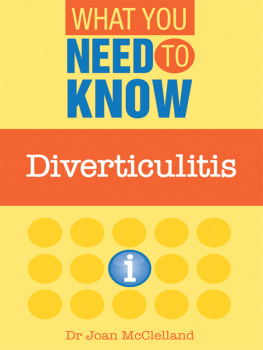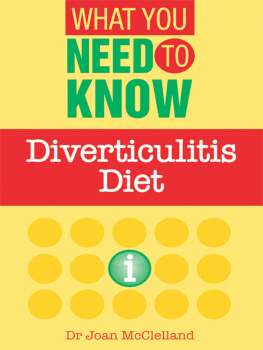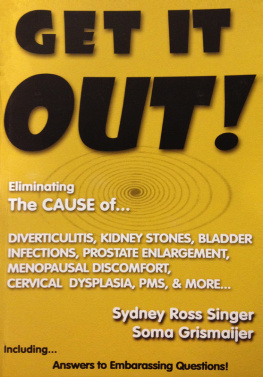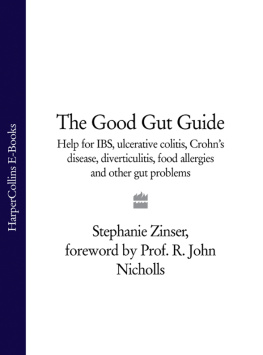Two women were sitting in front of me on the bus.
Diverticular disease? Ive never heard of it.
Well, thats what the doctor says my mothers got. I dont know whether to take it seriously, or whether its psychosomatic.
Thats the point. It doesnt. She seems perfectly OK apart from the odd tummy-ache. Shes a bit overweight - but who isnt at 60-plus - and, of course, shes always suffered from constipation. I tell her she ought to eat more greens.
It was quite by chance. Shed had a bit of trouble with piles and they did an X-ray just to check, and thats when they saw the signs of the diverticular disease. Apparently the piles were a clue, and lots of people have it without knowing.
I cant see it matters, in that case. Still, it gives your mother something to talk about.
Chapter One
What It Is and Why It Matters
The Gastroenterology Clinic (GUTS among friends) was crowded, as usual. I knew that as many as half the people my colleagues and I would see would have problems associated with diverticular disease. I wished that the ladies on the bus could have been there, so that I could have had a chance of giving them the facts. This is what I would have told them -
- Diverticular disease involves definite changes in the structure of the bowel - and there is nothing psychosomatic about that.
- It is so widespread that each of us stands a more than 50 per cent chance of getting it by the time we reach 60, but we may not always realize that we have got it.
- Although it may cause nothing worse than a little abdominal discomfort which you may brush aside, it has the potential to spring an emergency on you, at any time.
Diverticular disease is very common, can be dangerous, and is increasing rapidly, but it gets almost no media attention. There are one hundred people suffering from diverticular disease for every one with Crohns disease. Yet the latter is always in the news and diverticular disease is neglected.
The Digestive Disorders Foundation, a charity that promotes research into digestive problems, recently did something to redress the balance. They organized a major conference on diverticular disease. Two of us from the clinic attended it. Sufferers and others involved, as well as doctors, made up the audience - and it was the sufferers who asked the most searching and interesting questions.
What Is Diverticular Disease?
Diverticula (singular: diverticulum) are little pockets of gut lining that bulge out through the wall of the digestive tube. They can crop up anywhere along its length, but 90 per cent occur in the large intestine, or colon. Any problems associated with these diverticula come under the umbrella of diverticular disease, most properly called diverticular disease of the colon.
Broadly, diverticular disease comprises two conditions:
Diverticulosis always comes first. It just means the presence of diverticula.
A minimum of three diverticula are needed to make the diagnosis, but usually there are many more.
Diverticulitis involves inflammation and often infection of some of the diverticula.
As with arthrosis and arthritis, the version ending in -osis refers to simple wear and tear effects, while the -itis ending indicates inflammation, as in appendicitis or tonsillitis.
While diverticulosis may cause some pain or discomfort, it is often completely silent; you may not even know you have got it. In this situation the diagnosis is tricky and, as with the mother of the woman on the bus, it may only show up by chance. Diverticulitis, by contrast, is always painful and may also produce other symptoms.
Diverticulosis: often no symptoms
Diverticulitis: always painful, sometimes other symptoms
20-25 per cent of those with diverticulosis progress to diverticulitis.
Dangers arise when extra problems set in. For instance, in 1989, 1,480 people in England and Wales died because of complications related to diverticular disease. The death rate has increased steadily, year on year, since the beginning of the 20th century - apart from a significant standstill from 1939-45, when a restricted national diet was in force.
Who Is at Risk?
We may be able to reduce our personal risk if we understand the causes of the illness, and the preventative measures that can help.
Sex
The sexes come out roughly equal overall, but aged under 50 you are slightly more susceptible if you are a man, and aged 50 and over, women are more at risk. This trend is enhanced now we are all living longer, with women living even longer than men.
Age
Since diverticular disease is due to an age-related weakening of the muscles of the colon, the likelihood of having diverticular disease increases steadily as you get older. In fact, we are all likely to develop diverticula unless we die young, but we may never develop the symptoms of the disease.
Note: these percentages apply only in affluent countries like the US and UK.











